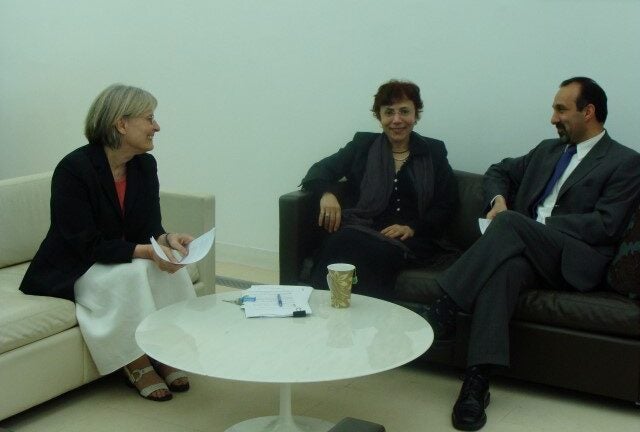Dialogue Series, Panels, Race & Society, Regional Studies
Jo Ann Moran Cruz & Haifaa Khalafallah on Religion and Legitimization of Political Rule

Georgetown University professors Jo Ann Moran Cruz and Haifaa Khalafallah gave the December 3, 2008, Monthly Dialogue lecture entitled “Religion and Legitimization of Political Rule in the Islamic and Christian Worlds: Preliminary Findings.” The presentation was part of a larger study entitled Religion and the State in the Christian and Islamic Worlds, in which both professors conducted research into coinciding Islamic and Christian historical experiences by juxtaposing a variety of primary sources.
Moran Cruz began the lecture by debating the prevailing current discourse on the “Clash of Civilizations.” She noted that the task of their study was to get beyond modern and ahistorical ideas, an example of which is “secular humanism,” which, she said, “is a problem in western scholarship. It is a term that does not stand up to scrutiny.” Moran also suggested that prevailing ideas on the role that religious hegemony has played in the West understate its influence on representative institutions. Khalafallah, in turn, argued that the bulk of historical evidence shows that the current narratives for the study of Islam blur and do not clarify our understanding of its historical experiences. She emphasized the importance of the memory of Medina and the role of consultative rule and legal methodologies in Islam.
Moran Cruz and Khalafallah further argued that both religions, although different from one another, shared a common historical concern with notions of “legitimacy.” Legitimacy, in this historical sense, is an “established, recognized, and accepted framework (legal, cultural, moral, social, procedural) that is paramount for the survival of political authority.” Both Muslim and Christian histories have been concerned with legitimacy and this concern has shaped social and legal infrastructures. Both Moran Cruz and Khalafallah took turns at explaining particular convergences between Muslim and Christian historical discourses and noted similarities between the two religions and how they informed the means of governance around the Mediterranean in each religious tradition.
Beginning with an examination of their formative years and foundational texts, the speakers noted that in both religions, there are scriptural indications, even if implicit, regarding what makes good governance. For example, Khalafallah noted that in the Qur’an, there are instructions to “respect persons in authority…a general endorsement of the notion of collective decision-making, including an explicit directive to consult,” as well as an emphasis on notions of “egalitarianism and equality.”
In their formative years, there was the Pauline model of governance in the Christian context and the Medina model in the Muslim one, both of which are marked by persuasion, connections, negotiated settlement of disputes, as well as extreme fluidity. Using religion to legitimate political authority, the professors argued, became high on the agenda after the triumph of authoritarian states that were, for the most part, illegitimate. Moran Cruz noted that, subsequently, in the struggle for legitimacy, “both cultures have struck varying balances between theocratic and civil governments and between religious and political authorities.” The narratives in both religious traditions are similar with regard to these dynamics, although differing in other fundamental ways.
In conclusion, both Moran Cruz and Khalafallah argued for situating current narratives on Islam and Christianity and their relations to each other in their historical contexts in order to better understand their common experiences and differences vis-à-vis political authority as well as to be able to locate their current ones, rather than focusing on “otherness.”
Article by Suzi Mirgani, CIRS Publications Coordinator.